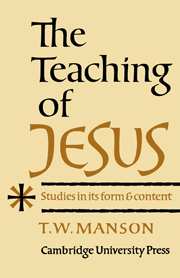Book contents
- Frontmatter
- Contents
- Preface
- LIST OF ABBREVIATIONS
- PART I PRELIMINARY QUESTIONS
- PART II THE CONTENTS OF THE TEACHING
- Chap. IV God as Father
- Chap. V God as King
- Chap. VI God as King: The Eternal Sovereignty
- Chap. VII God as King: The Kingdom in the World
- Detached Note C. The Terms ‘Disciple’ and ‘Apostle’
- Chap. VIII God as King: The Final Consummation
- Chap. IX Religion and Morals
- Detached Note D. On Mk x. 42–44
- Detached Note E. On Mk vii. 6–13
- Appendices I–VI
- Additional Notes
- General Index
- Reference Index
Detached Note D. On Mk x. 42–44
Published online by Cambridge University Press: 31 March 2010
- Frontmatter
- Contents
- Preface
- LIST OF ABBREVIATIONS
- PART I PRELIMINARY QUESTIONS
- PART II THE CONTENTS OF THE TEACHING
- Chap. IV God as Father
- Chap. V God as King
- Chap. VI God as King: The Eternal Sovereignty
- Chap. VII God as King: The Kingdom in the World
- Detached Note C. The Terms ‘Disciple’ and ‘Apostle’
- Chap. VIII God as King: The Final Consummation
- Chap. IX Religion and Morals
- Detached Note D. On Mk x. 42–44
- Detached Note E. On Mk vii. 6–13
- Appendices I–VI
- Additional Notes
- General Index
- Reference Index
Summary
The meaning of this passage is obscured for us by the translations commonly given of the phrase οἱ δοκοῦντες ἄρχειν. The Vulgate gives ‘hi qui uidentur principari’: and this is the sense which is given to the Greek by Tyndale: ‘they whych seme to beare rule’. The Authorised Version has: ‘they which are accounted to rule’ with the marginal alternative, ‘they which think good to rule’. The Revised Version follows the Authorised with the exception that the second rendering is dropped. Dr Moffatt writes: ‘the so-called rulers’. The modern German versions are to much the same effect. ‘Die, welche für Fürsten der Völker gelten’ (Wellhausen, Ev. Marci, 1903; H.B.N.T. 1919); ‘Die, welche die Völker zu regieren scheinen’ (S.N.T.3).
The objections to this way of translating the Greek are:
(1) That it makes δοκοῦντες mean something which is quite pointless, not to say false. The kings and emperors in the first century a.d. did not seem to rule. They did rule, and usually with a heavy hand. No one who lived under the sway of Tiberius would have found anything illusory about his power.
(2) It throws the emphasis on to the question what the rulers of the Gentiles do with their power. That they exercised their authority in a despotic manner is no doubt true; but that fact has little or nothing to do with the matter which is under discussion in this passage.
[…]
- Type
- Chapter
- Information
- Teaching of Jesus , pp. 313 - 315Publisher: Cambridge University PressPrint publication year: 1935

